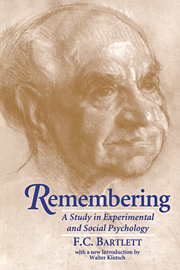Book contents
- Frontmatter
- Contents
- Biography of Sir Frederic C. Bartlett
- Introduction by Walter Kintsch
- Preface
- PART I EXPERIMENTAL STUDIES
- PART II REMEMBERING AS A STUDY IN SOCIAL PSYCHOLOGY
- Chapter XIII Social Psychology
- Chapter XIV Social Psychology and the Matter of Recall
- Chapter XV Social Psychology and the Manner of Recall
- Chapter XVI Conventionalisation
- Chapter XVII The Notion of a Collective Unconscious
- Chapter XVIII The Basis of Social Recall
- Chapter XIX A Summary and Some Conclusions
- Index
- Plate section
Chapter XIII - Social Psychology
Published online by Cambridge University Press: 04 August 2010
- Frontmatter
- Contents
- Biography of Sir Frederic C. Bartlett
- Introduction by Walter Kintsch
- Preface
- PART I EXPERIMENTAL STUDIES
- PART II REMEMBERING AS A STUDY IN SOCIAL PSYCHOLOGY
- Chapter XIII Social Psychology
- Chapter XIV Social Psychology and the Matter of Recall
- Chapter XV Social Psychology and the Manner of Recall
- Chapter XVI Conventionalisation
- Chapter XVII The Notion of a Collective Unconscious
- Chapter XVIII The Basis of Social Recall
- Chapter XIX A Summary and Some Conclusions
- Index
- Plate section
Summary
A DEFINITION
In its modern aspects, social psychology had a brilliant beginning when Prof. William McDougall wrote his Introduction to Social Psychology, but since then it seems to have made very little advance. In one sense, McDougall's book, in spite of its outstanding originality and value, has had a bad influence. As everybody now knows, he based the whole of his treatment upon the view that instinctive activities are of primary importance in all social life. Every possible social reaction is considered to be ultimately explicable in terms of instinctive tendencies. This was a controversial subject when McDougall approached it, and it is so still. His treatment has tended to make psychological discussions of social problems a field of battle between instinct psychologies and psychologies of every other kind. Also his tentative catalogue of instincts has led to a large number of other catalogues of varying length and content, as if the mere listing of instincts itself sheds a great light upon social responses. In the hurly-burly of dispute a great amount has been said about instincts, but very much less about social conduct in any genuinely observed sense, except by anthropologists whose interests are apt to stop short at detailed description.
If any advance is to be made, the first thing that is necessary is a clear realisation by the social psychologist of the precise ‘lie’ of his problems. This may initially seem to be a fairly simple matter. We can define social psychology as the systematic study of the modifications of individual experience and response due directly to membership of a group.
- Type
- Chapter
- Information
- RememberingA Study in Experimental and Social Psychology, pp. 239 - 246Publisher: Cambridge University PressPrint publication year: 1995



